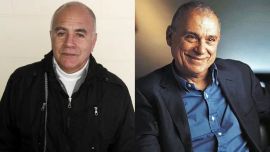Paraguayans go the polls Sunday for the South American country's closest presidential race in many years, with a centre-leftist coalition hoping to end an almost unbroken, seven-decade run for the ruling right-wing Colourado party.
The vote comes at a difficult time for the party that has governed almost continually since the 1950s – through a dictatorship and since the return of democracy in 1989 – with several of its leaders recently sanctioned for graft by the United States.
This has complicated the position of the party's presidential candidate Santiago Pena, a 44-year-old economist and former finance minister whose political mentor, ex-president Horacio Cartes, is among those under suspicion.
Pena faces 60-year-old lawyer Efraín Alegre of the Concertacion coalition of centre-left parties, who is leading narrowly in opinion polls amid a recent anti-incumbency trend in Latin American elections.
"They (the Colourado party) know that we will win, so they feel nervous," Alegre told AFP this week.
In the last election in 2018, President Mario Abdo Benitez took victory for the Colourado party by a slim margin of less than four percentage points.
Opinion polls indicate this year's race is even closer in a country that only allows a president to serve one term.
Polling group AtlasIntel has placed Alegre in a slight lead with 34.3 percent of voter intention compared to 32.8 percent for Pena. An anti-establishment right-wing party is in third place with 23 percent.
"You don't win with surveys, you don't win with resumes," Pena told AFP.
"You win with the popular vote that manifests itself on election day. I feel very calm, very peaceful knowing that I have given everything humanly possible," he said.
Though they differ on economic policy, the two frontrunners are both socially conservative, holding strong anti-abortion and anti-gay marriage stances in the overwhelmingly Catholic nation.
'Not interested'
Paraguayan presidential elections are determined in a single, winner-takes-all round.
Some 4.8 million of the country's 7.5 million inhabitants are eligible to take part in the election, which will also decide the next legislature and choose 17 governors.
The composition of the 45-member Senate will ultimately decide whether the Colourado Party can effectively remain in power – and whether it can hold onto it with the party split between backers of Cartes and those of Abdo.
"The worst opposition Pena will have, if he wins, will be within his party, not outside it," Paraguayan political analyst Sebastian Acha told AFP.
Apart from corruption, which has angered the population, other issues that are key in the election include an escalating crime problem, poverty and social inequality.
Paraguay's GDP is expected to grow 4.8 percent in 2023, according to the central bank, and 4.5 percent according to the IMF – one of the highest rates in Latin America.
But poverty affects about a quarter of the population.
"The great problem of Paraguay is not having achieved greater balance in the distribution of income to achieve greater equity," economist Ruben Ramirez of the Trade and Investment Paraguay consultancy in Asuncion told AFP.
Paraguay's Indigenous minority feels especially neglected.
"Paraguay, although it is among the economies that least felt the impact of the pandemic... does not escape being a country where economic inequality continues to exist in its population," added economist Stan Canova.
Many have lost faith in the system.
"I am not interested. We're not going to vote," said Albino Cubas, who shares a ramshackle wooden hut with his wife and three children in the capital's Tacumbu slum.
"I have not seen a serious proposal for the poor," said Cubas.
"We are five minutes from the centre (of the capital), from Congress, from the government, and they do not see what is happening here. People without electricity, children loitering... our needs can surely be seen with the naked eye?"
Crime is also a concern, with an anti-mafia prosecutor and a crime-fighting mayor killed in recent months as smuggling cartels settle scores.
Experts say landlocked Paraguay – nestled between Brazil, Bolivia and Argentina – has become an important launchpad for drugs headed for Europe.
On the international front, an Alegre win could see Paraguay – one of Taiwan's 13 remaining diplomatic allies – shift allegiance to China.
"Relations with Taiwan mean the loss of one of the largest markets, which is China," he told AFP.
by Nina Negron, AFP



















Comments